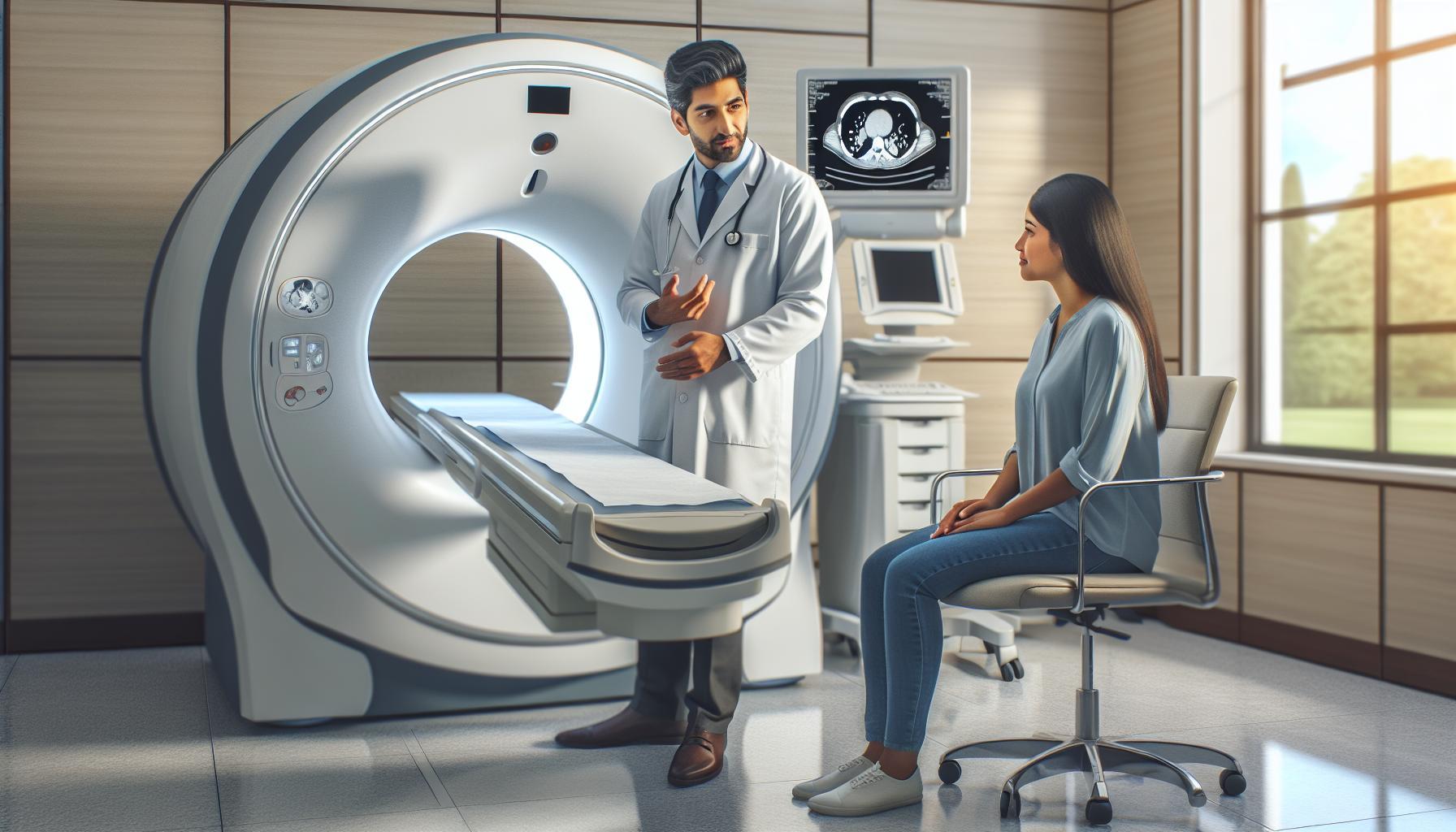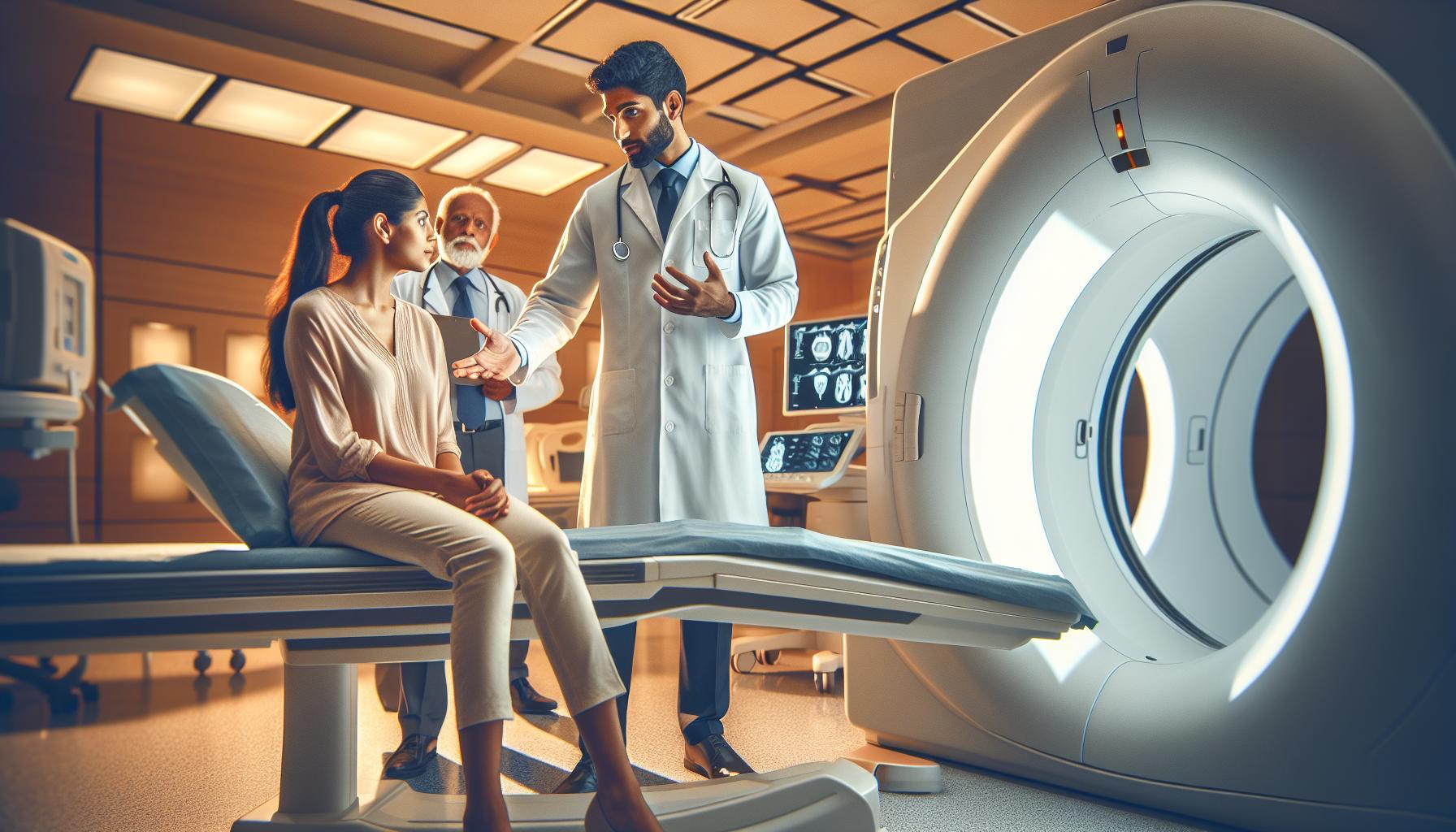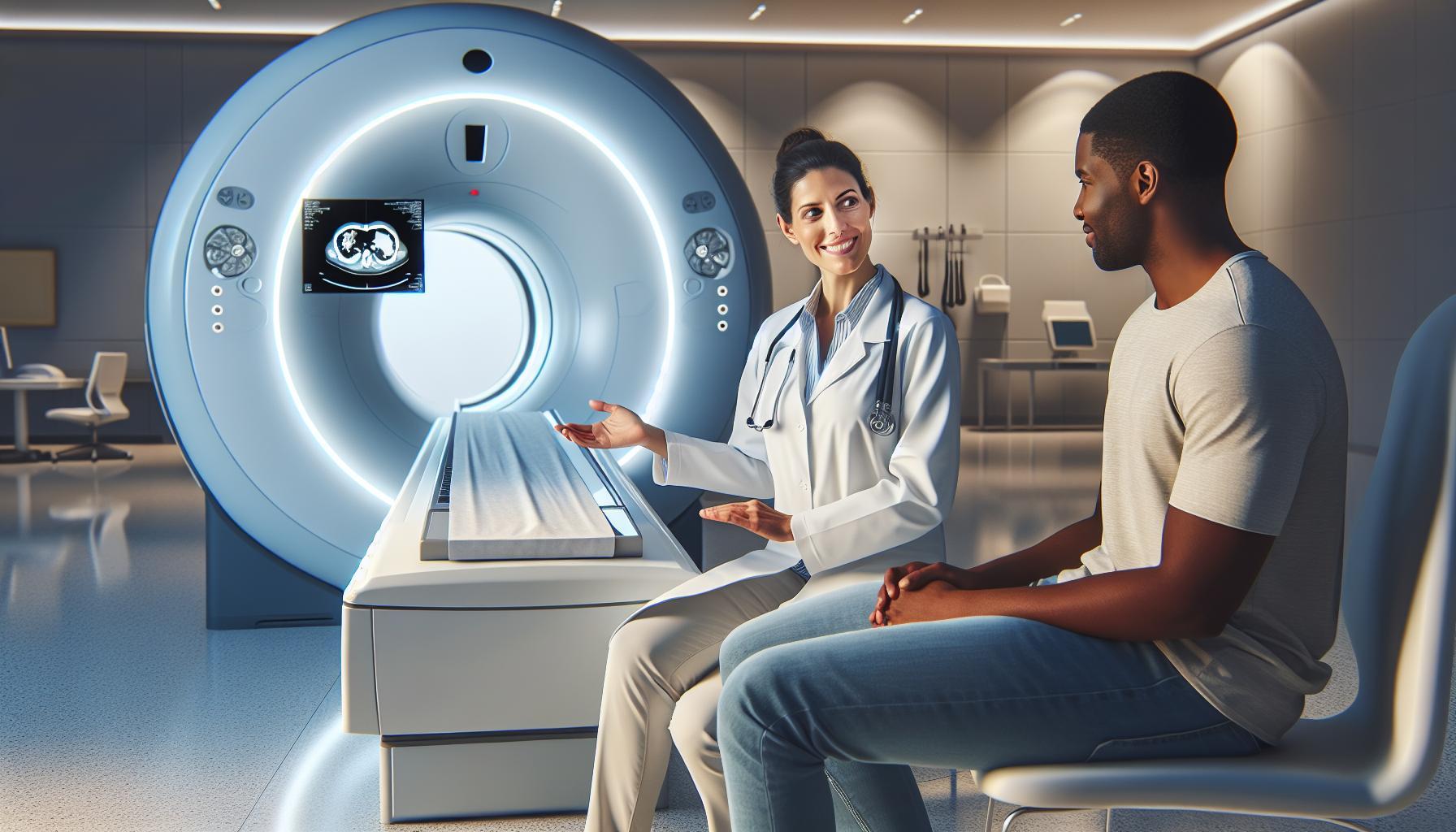Colon cancer is one of the leading causes of cancer-related deaths, but early detection can significantly improve outcomes. One promising diagnostic tool is the CT scan, known for its ability to provide detailed images of the colon. But can it truly diagnose colon cancer effectively? Understanding the capabilities and limitations of CT scans is essential for anyone concerned about their health or that of a loved one.
Many people feel anxious about potential cancer diagnoses and the tests involved. Knowing what to expect from a CT scan can alleviate some of this fear, empowering you with critical information. In this article, we will explore how CT scans work, what they can reveal about colon cancer, and the importance of consulting healthcare professionals for personalized insights. Stay with us as we delve into the truth about detection and help you navigate this crucial aspect of health management.
Can a CT Scan Really Diagnose Colon Cancer?
Colon cancer is a serious health concern, with early detection being crucial for effective treatment. One of the tools available for diagnosing colon cancer is the CT scan, specifically a technique known as CT colonography. This non-invasive imaging method utilizes advanced X-ray technology to create detailed images of the colon, allowing physicians to identify any irregularities such as tumors or polyps. The accuracy of CT scans in detecting colorectal cancer can be quite high, particularly for larger lesions, making them a valuable option in screening and diagnostic protocols.
When undergoing a CT colonography, patients can expect a comprehensive procedure. It typically begins with the administration of a contrast agent to enhance clarity in the images; this may involve some discomfort, such as the sensation of fullness due to air being pumped into the colon. A radiologist analyzes the images produced to look for any suspicious areas that might indicate cancerous growths. While CT scans are effective at locating many polyps or tumors, it’s essential to note that they do have limitations. Smaller lesions may be more challenging to detect compared to more prominent ones, which is why a follow-up colonoscopy is often recommended if any abnormalities are identified.
The recommendation for a CT scan may arise in various contexts, such as in patients with symptoms suggestive of colon cancer or as part of routine screening for those at higher risk. Many healthcare providers emphasize that while CT scans are beneficial diagnostic tools, they should be used in conjunction with other methods, such as traditional colonoscopy, to provide a comprehensive assessment. If you’re considering a CT scan for colon cancer screening or diagnosis, discussing this option with your healthcare provider will help you understand its appropriateness based on your individual medical history and risk factors.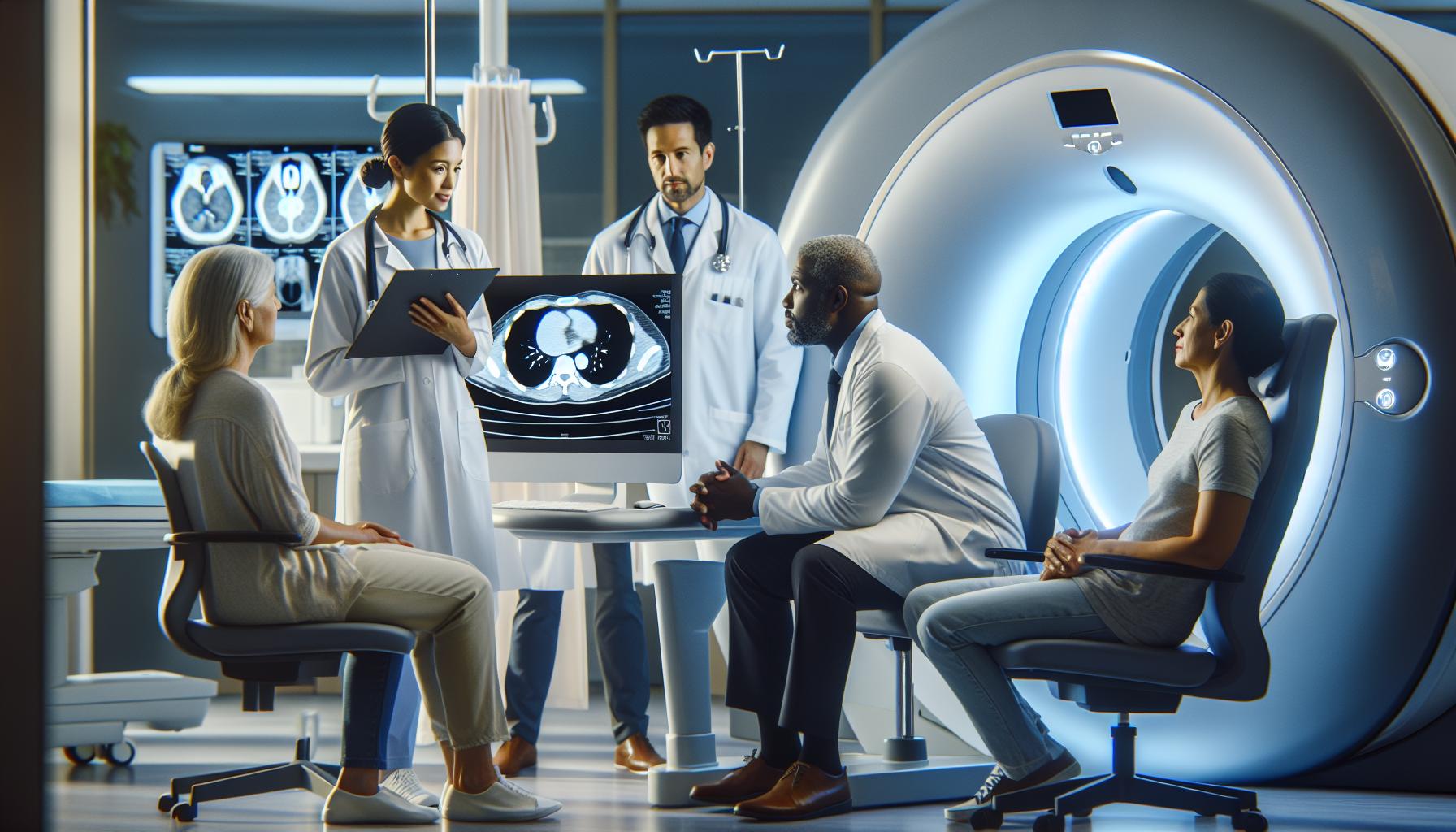
Understanding Colon Cancer Detection Methods
Colon cancer remains one of the leading cancers affecting individuals today, making early detection paramount for successful outcomes. Understanding the various methods available for detecting colon cancer can empower patients to advocate for their health effectively. Among these methods, imaging tests like CT colonography have gained prominence for their non-invasive nature and detailed imaging capabilities.
Common Detection Methods for Colon Cancer
Colon cancer can be detected through a combination of screening strategies that may include:
- Colonoscopy: This is the gold standard for detecting colon cancer. A physician examines the entire colon using a flexible tube with a camera, allowing immediate biopsy of suspicious areas.
- CT Colonography (Virtual Colonoscopy): Utilizing CT imaging technology, this method provides a detailed view of the colon and can detect polyps and tumors. Patients benefit from a less invasive procedure compared to traditional colonoscopy, although it may require follow-up with a regular colonoscopy if abnormalities are found.
- Stool-Based Tests: Tests like FIT (Fecal Immunochemical Test) and Cologuard detect blood or abnormal DNA in stool samples, serving as preliminary screening tools that can indicate whether further investigation is warranted.
Each method has its strengths and specific indications, with the choice often guided by patient factors such as age, risk level, and personal preferences.
Why Screening is Crucial
Regular screening is significant because colon cancer often develops without noticeable symptoms in its early stages. The American Cancer Society advises that average-risk adults start screening at age 45 or earlier for those with risk factors, such as a family history of colorectal cancer. Patients should engage in discussions with their healthcare providers to establish an individualized screening plan that best fits their medical history and risk factors.
Recognizing common symptoms, such as changes in bowel habits, unexpected weight loss, or abdominal discomfort, is also vital. These signs can be cues that prompt a discussion about testing options with a medical professional. An informed approach to colon cancer detection strategies ultimately contributes to early diagnosis and improved treatment outcomes.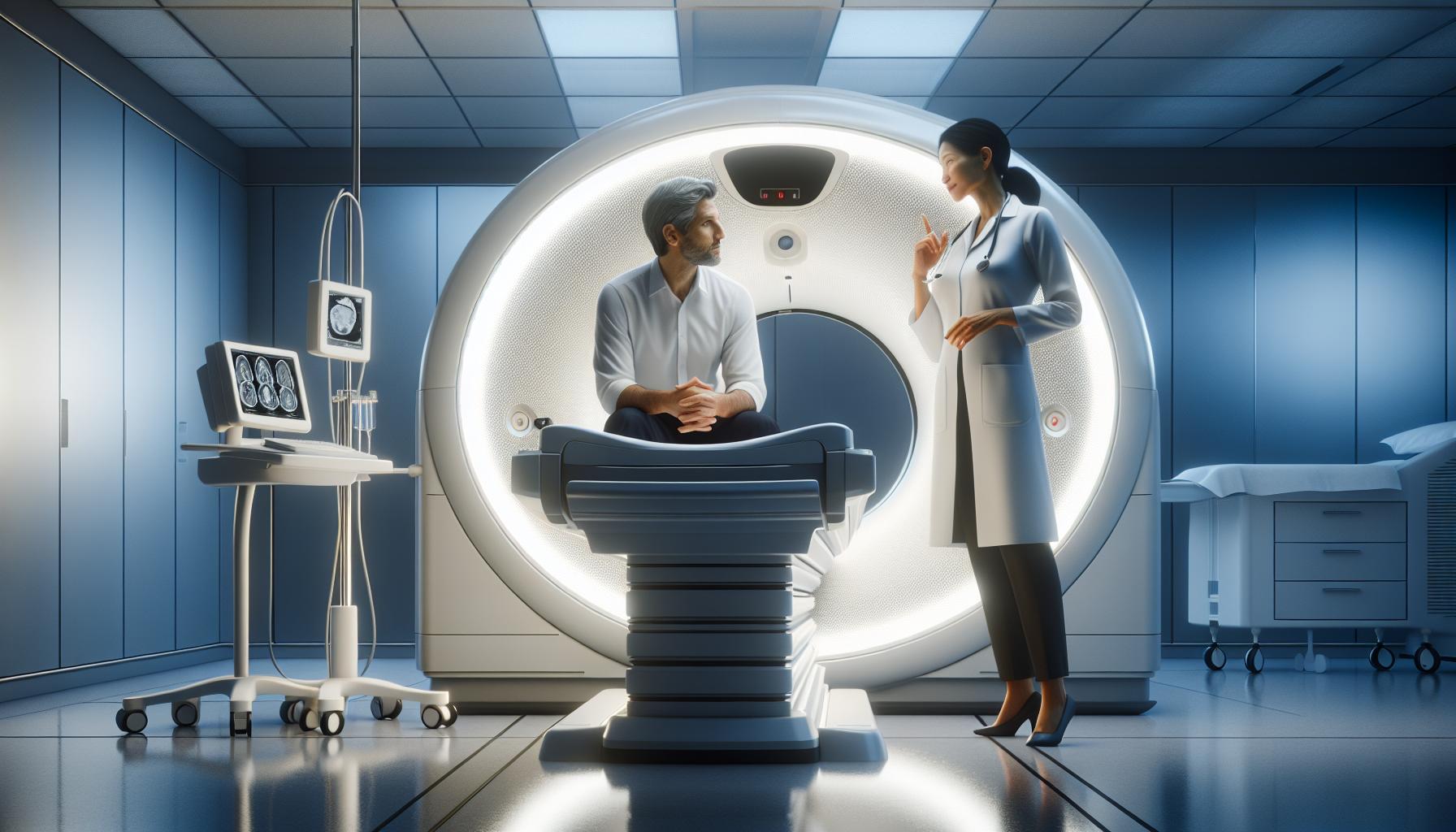
How CT Scans Work: A Step-by-Step Guide
A CT scan, particularly CT colonography, is an advanced imaging technique that plays a significant role in diagnosing colon cancer and other abnormalities within the colon. Understanding how this technology works can alleviate any concerns patients may have about the procedure and clarify what to expect.
The process begins with the preparation stage, where the patient is advised to follow specific dietary restrictions and potentially use laxatives to ensure the colon is completely clear. This preparation is crucial as it allows for the clearest images possible, minimizing the chances of missing polyps or tumors. Once at the imaging facility, the patient will be positioned comfortably on a moving table that will pass through a large, donut-shaped CT scanner. The scanner takes multiple X-ray images of the abdomen from different angles and uses advanced computer algorithms to create a detailed, cross-sectional view of the colon.
During the scan, a contrast material may be administered, either orally or through an enema, to enhance the visibility of the colon’s inner walls. Patients might experience a sensation of fullness as the air or fluid expands the colon, similar to needing to pass gas. While the procedure may feel somewhat uncomfortable, it is typically quick, lasting only about 30 minutes or less. The actual imaging process is painless, and patients are usually instructed to remain still to ensure optimal image quality.
After the procedure, the images are scrutinized by a radiologist, who will look for any signs of abnormal growths, such as polyps or tumors. The results are forwarded to the primary care provider, who will discuss the findings with the patient and recommend any necessary follow-up actions. It’s important for patients to remember that while CT colonography is highly effective at spotting issues, a full colonoscopy may still be recommended if the scan reveals any abnormalities. This additional step allows for direct visualization and potential biopsy of any suspicious lesions, reinforcing the importance of thorough follow-up care in the management of colon health.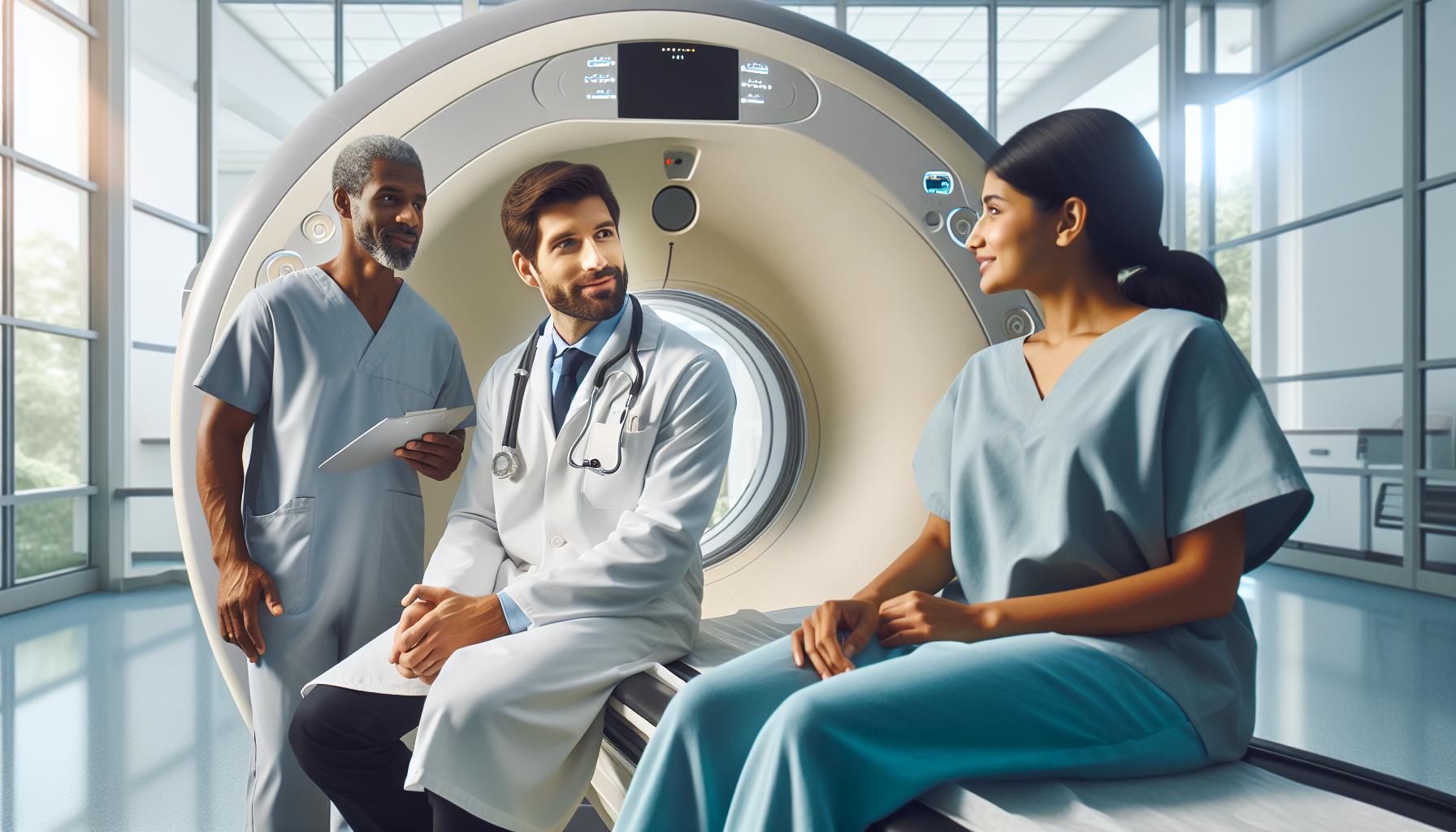
Preparing for a CT Scan: What Patients Should Know
Preparing for a CT scan can seem daunting, but understanding the steps involved can significantly reduce anxiety and ensure a smooth experience. A critical part of this process is bowel preparation, which is essential for obtaining clear images. Typically, your healthcare team will provide specific instructions, which may include dietary changes and the use of laxatives or an oral preparation solution. This helps clear the colon, minimizing the risk of obscured images that could lead to misdiagnosis.
It’s also important to communicate with your healthcare provider about any medications you are currently taking, as certain medications may need to be paused or adjusted. Patients should be mindful of food and drink restrictions, commonly advised to avoid solid foods for several hours before the scan and to consume only clear liquids. Upon arrival at the imaging facility, you may be asked to wear a gown and remove any metal objects like jewelry, which can interfere with the imaging process.
During the CT scan, you might feel some discomfort due to the contrast material used to enhance the images, but this is typically brief. Knowing what to expect can help alleviate nervousness about the procedure. It’s also advisable to plan for someone to drive you home afterward, especially if a sedative is used in conjunction with the contrast material. Finally, don’t hesitate to ask your healthcare team any questions you may have beforehand-understanding the procedure will empower you and help ensure a positive experience.
CT Scans vs. Other Imaging Techniques
While many patients are aware of the role that various imaging techniques play in the diagnosis of colon cancer, understanding the differences can significantly affect their testing experience and outcomes. One of the advanced methods used for this purpose is CT colonography, also known as virtual colonoscopy, which offers unique advantages compared to standard colonoscopy and other imaging modalities.
CT colonography uses computed tomography (CT) scans to create detailed images of the large intestine. Unlike traditional colonoscopy, which involves inserting a long flexible tube with a camera into the rectum, CT colonography requires less invasive preparation and might be more comfortable for some patients. During the procedure, a contrast material is used to inflate the colon, providing clearer images without the need for direct visualization by an endoscope. This imaging method is beneficial for patients who may be unable or unwilling to undergo a standard colonoscopy.
In contrast, conventional x-rays and ultrasound are less effective for detecting colon cancer due to their limited resolution and inability to visualize soft tissues in detail. While traditional x-rays can show large obstructions or masses, they fall short in identifying polyps or early cancer stages. Ultrasound, on the other hand, is usually used for evaluating abdominal organs but lacks the specificity needed to assess the colon thoroughly.
Despite its advantages, CT colonography is not universally recommended over standard colonoscopy, especially if polyp removal is necessary, as this can only be accomplished during a conventional procedure. Additionally, guidelines often suggest that individuals at average risk for colon cancer begin screening at age 45 and discuss the best approach with their healthcare provider to personalize their screening strategy. Ultimately, understanding the differences between these imaging techniques enables patients to make informed decisions about their health and screening options. It is essential to consult with a healthcare professional to identify the most suitable test based on individual health history and risk factors.
The Accuracy of CT Scans for Colon Cancer Diagnosis
The ability of CT scans, particularly CT colonography, to accurately diagnose colon cancer has gained attention for its advanced imaging capabilities. Studies indicate that CT colonography can detect colorectal cancer with sensitivities ranging from 75% to 100% and specificities between 86% and 96% in some cases, positioning it as a reliable tool for identifying changes in the colon that may indicate malignancy [1[1]. The method uses advanced CT imaging technology to create detailed cross-sectional images of the colon, allowing radiologists to spot tumors, polyps, and other abnormalities that require further evaluation.
For many patients, the prospect of undergoing a less invasive procedure is appealing, especially since traditional colonoscopy can be more uncomfortable and requires a more extensive bowel preparation. CT colonography utilizes a contrast agent to minimally inflate the bowel, improving visibility without the direct intervention of an endoscope. This approach can be particularly beneficial for individuals who may have difficulty with traditional colonoscopy or those who are apprehensive about the procedure [3[3].
However, while CT scans can be highly effective, they do have limitations. It is important for patients to consider that not all cancers may be detected by this imaging technique, particularly smaller polyps or early-stage cancers that might require closer examination through a standard colonoscopy. Additionally, the accuracy of CT colonography can be influenced by factors such as bowel preparation and the skill of the interpreting radiologist. Therefore, anyone undergoing screening for colon cancer should have an open discussion with their healthcare provider about the best options for their individual circumstances, ensuring that they choose a strategy that aligns with their personal health needs and risk factors.
Limitations of CT Imaging in Detecting Colon Cancer
The promise of CT imaging in diagnosing colon cancer is undeniably significant; however, understanding its limitations is equally crucial for patients navigating their screening options. While CT colonography can offer impressive sensitivity and specificity in detecting colorectal cancer, it is not foolproof. Notably, smaller polyps or cancers in their early stages may evade detection through this imaging technique. For instance, lesions less than one centimeter in size are often challenging to visualize clearly, which can lead to false negatives.
Another factor influencing the effectiveness of CT scans is the quality of bowel preparation prior to the procedure. An inadequately cleaned colon can obscure vital details, making it harder for radiologists to identify abnormal growths. The skill level of the interpreting radiologist also plays a pivotal role; discrepancies in radiologist experience and proficiency can lead to variations in diagnoses. These elements create a scenario where a CT scan may provide incomplete or inconclusive results, which necessitates follow-up procedures, such as a traditional colonoscopy, for further evaluation.
It’s important for patients to have open discussions with their healthcare providers about these constraints. Questions regarding the likelihood of detecting specific abnormalities, the adequacy of bowel preparation methods, and the qualifications of the interpreting radiologist can empower patients. Ultimately, while CT colonography can serve as a useful screening tool, it is essential to view it as part of a broader diagnostic strategy, rather than a standalone solution. A thorough understanding of its limitations will aid in making informed decisions regarding personal health care options.
Interpreting CT Scan Results: What to Expect
Understanding the results of a CT scan can be pivotal for patients concerned about colon cancer. Directly after the procedure, you might feel a mix of anticipation and anxiety while awaiting your results. Radiologists interpret the images to identify any abnormalities, such as polyps or tumors, that could indicate colorectal cancer. They will assess the size, shape, and location of any potential lesions, comparing them against standard criteria for normal findings. It’s important to understand that findings can range from clear indications of pathology to ambiguous results that require further investigation.
What to Expect After the Scan
Typically, your doctor will contact you with the results within a few days. During this time, it’s common to feel nervous; this is entirely normal. Your healthcare provider may schedule a follow-up appointment to discuss the findings in detail. If the scan reveals abnormalities, they may recommend additional tests, such as a colonoscopy, for further evaluation. This can be an opportunity for direct visualization of the colon and the possibility to remove any suspicious polyps or samples for biopsy.
Understanding the Results
CT scan results are reported in a formal document that your doctor will review with you. Here’s what you might encounter in the results:
- Normal Findings: No clear signs of cancer or polyps.
- Suspicious Findings: Possibility of polyps or fatty tumors that may need further examination.
- Clearly Abnormal Findings: Detection of lesions, polyps, or signs consistent with colorectal cancer.
The language used in the report may seem complex; don’t hesitate to ask your doctor for clarification on any terms or implications of the findings.
Communicating with Your Healthcare Provider
Open communication with your healthcare provider is crucial. Prepare questions in advance about what the results mean for your health moving forward. Consider asking about:
- What do the results indicate regarding the risk of cancer?
- What are the next steps if the findings are abnormal?
- How frequently should I be screened in the future?
It’s vital to feel supported and informed throughout this process. Remember, a CT scan is a tool that aids in diagnosis but does not provide an absolute answer on its own. Your healthcare team is available to guide you through your diagnosis and the appropriate follow-up actions, ensuring that all your questions are addressed, which can greatly reduce feelings of uncertainty.
When is a CT Scan Recommended for Colon Cancer?
A CT scan may be recommended as a diagnostic tool for colon cancer under several specific circumstances. Frequently, it serves as an essential component in the overall strategy to investigate symptoms or findings from other tests. For individuals experiencing unexplained abdominal pain, significant changes in bowel habits, or unexplained weight loss, a CT scan can provide valuable insights into the state of the colon and surrounding tissues.
In addition, CT scans are particularly useful for staging colon cancer once a diagnosis has been established. They help determine the extent of the cancer by visualizing whether the disease has spread to nearby lymph nodes or other organs. This staging is crucial for developing a tailored treatment plan, as it guides decisions regarding surgical interventions, chemotherapy, or other modalities. Patients may also encounter CT scans if they have a family history of colorectal cancer or other risk factors that warrant closer monitoring.
It’s imperative for patients to prepare for the potential implications of a CT scan, ensuring they discuss their specific health history and any concerns with their healthcare provider. This preparatory conversation not only provides clarity on the necessity of the scan but also helps in understanding what to expect during and after the procedure. These proactive discussions can alleviate anxiety and empower individuals by equipping them with knowledge about their diagnosis and treatment plan.
Ultimately, the decision to utilize a CT scan as a diagnostic tool for colon cancer rests on a careful assessment of patient symptoms and risk factors by healthcare professionals. This collaborative approach underscores the importance of open communication and personalized care in managing health concerns related to colorectal cancer.
Cost and Availability of CT Scans for Patients
Navigating the cost and availability of CT scans can be a daunting aspect of managing health concerns, especially when facing potential diagnoses like colon cancer. Understanding the financial implications and accessibility of this critical imaging tool is essential for patients. The cost of a CT scan can vary widely depending on factors such as geographic location, whether the scan is performed in a hospital or outpatient setting, and the specific type of scan being conducted. As a general estimate, patients can expect to pay anywhere from $500 to $3,000 out-of-pocket, although many insurance plans cover a significant portion of this cost, especially if the scan is deemed medically necessary.
When assessing availability, patients should consider several factors. Many hospitals and imaging centers offer CT scans; however, wait times can differ significantly. Some facilities may provide same-day appointments, which can be crucial for timely diagnosis and treatment. It is advisable for patients to contact their healthcare provider or local imaging centers to inquire about the availability of CT scans, potential scheduling options, and the expected costs involved. Patients should also check with their health insurance providers to confirm coverage specifics and any pre-authorization requirements, which can streamline the process and alleviate unexpected expenses.
For individuals without insurance or those with limited coverage, there are often community health programs and sliding scale services available that can help reduce costs. It’s beneficial to investigate these options and discuss them with healthcare professionals, who can guide patients toward appropriate resources. Additionally, some hospitals may offer payment plans or financial assistance programs for those incurring high medical costs, alleviating some of the burdens related to essential diagnostic procedures. By proactively engaging with healthcare providers about financial concerns, patients can foster a more supportive and understanding approach to managing their health needs.
Potential Risks and Safety of CT Scans
Undergoing a CT scan can be an essential step in detecting colon cancer, but it’s natural for patients to have concerns about the safety and potential risks associated with this diagnostic tool. CT scans use X-ray technology to create detailed images of the body, which can help doctors identify abnormalities, including tumors in the colon. While these scans are generally safe and effective, understanding the risks involved can help you feel more empowered and prepared.
The primary risk associated with a CT scan stems from exposure to ionizing radiation, which can increase the risk of developing cancer later in life, albeit the likelihood is small. For most adults, the amount of radiation from a single CT scan is comparable to what they would receive from natural environmental sources over several years. However, this risk may be more significant for children and young adults whose bodies are still developing. Thus, it is crucial to have a thorough discussion with your healthcare provider about the necessity of the scan and any potential alternatives that might reduce radiation exposure.
Another consideration is the preparation required before a CT scan, particularly for detecting colon abnormalities. Patients may need to undergo bowel preparation, which can involve dietary restrictions or laxatives. While these preparations are crucial for obtaining clear images, they can sometimes lead to temporary discomfort or distress, such as bloating or dehydration. It’s essential to follow your doctor’s instructions closely and discuss any concerns you may have regarding the preparation process.
In rare cases, some individuals may experience allergic reactions to contrast materials used during the scan to enhance the images. If you have a history of allergies, particularly to iodine or shellfish, make sure to inform your healthcare provider so they can take appropriate precautions. Always ask questions or voice any worries-you are your best advocate when it comes to your health and well-being. By understanding the potential risks and discussing them with your medical team, you can make informed decisions about your diagnostic options while feeling more secure about the process.
Questions to Ask Your Doctor Before a CT Scan
Before undergoing a CT scan, particularly for the detection of colon cancer, engaging in an open dialogue with your healthcare provider is essential. Your questions not only equip you with valuable knowledge but also help in alleviating any anxiety surrounding the procedure. Here are some important inquiries you might consider asking:
Understanding the Need for the Scan
- Why is a CT scan necessary for my diagnosis? Understanding the specific reasons for the scan can help you grasp its importance in your treatment plan.
- Are there alternative imaging options available? Knowing about other potential tests (like MRI or traditional colonoscopy) can empower you to make informed decisions regarding your care.
Preparing for the CT Scan
- What preparation will I need to undergo? Clarifying dietary restrictions and the need for bowel cleansing will help you feel more comfortable on the day of the scan.
- How long will the preparation take? Understanding the timing helps manage your schedule and any potential discomfort ahead of the procedure.
Details About the Procedure
- What can I expect during the CT scan? Discussing the procedure timeline and what happens during the scan itself will put you more at ease.
- Will I need contrast dye, and are there risks associated with it? If contrast material is necessary, discussing any allergies you may have prepares the medical team to take precautions.
Post-Scan Considerations
- How and when will I receive the results? Knowing the timeframe for result availability helps you manage your expectations and anxiety.
- What are the potential risks of undergoing a CT scan? Understanding both the benefits and risks, particularly regarding radiation exposure, is paramount for informed consent.
Taking the initiative to ask these questions fosters a proactive approach to your health care. Remember, your healthcare provider is there to support you, ensuring you understand every step of the process as you navigate your medical journey.
Faq
Q: Can a CT scan detect early-stage colon cancer?
A: A CT scan can help identify abnormal growths, such as polyps or tumors, in the colon, but it may not always detect early-stage colon cancer, especially small lesions. Combining CT scans with other diagnostic methods enhances early detection effectiveness. Always consult your doctor for personalized recommendations.
Q: How accurate are CT scans in diagnosing colon cancer?
A: CT scans offer good sensitivity for detecting larger tumors or metastatic disease but may miss smaller polyps or early-stage cancers. The accuracy is often improved when CT scans are used alongside other tests like colonoscopy. Discuss your options with your healthcare provider for the best approach.
Q: What are the advantages of using CT scans for colon cancer screening?
A: CT scans provide a non-invasive option for visualizing the colon and can identify large polyps and cancer. They are quicker and less invasive than traditional colonoscopy, and some patients may prefer CT colonography due to less anxiety associated with the procedure.
Q: When is a colonoscopy preferred over a CT scan for colon cancer diagnosis?
A: A colonoscopy is preferred when a direct visualization and potential biopsy of colonic tissue are needed. It is also recommended if initial CT scan results suggest abnormalities. Invasive methods like colonoscopy enable immediate treatment options, such as polyp removal.
Q: Are there any limitations to CT scans for diagnosing colon cancer?
A: Yes, CT scans may not detect small polyps or early-stage colon cancer effectively and might yield false positives or negatives. Additionally, they require bowel preparation, which might be uncomfortable for some patients. Discuss these limitations with your healthcare provider.
Q: How can patients prepare for a CT scan designed to detect colon cancer?
A: Patients typically need to have an empty bowel, which involves dietary restrictions and possibly a bowel prep solution prior to the scan. Follow the specific instructions from your healthcare provider to ensure accurate results.
Q: Can a CT scan distinguish between benign and malignant growths in the colon?
A: While a CT scan can identify abnormalities, it usually cannot definitively differentiate between benign and malignant growths. Further evaluation, including a biopsy through colonoscopy, is often necessary for an accurate diagnosis.
Q: Are CT scans safe for colon cancer detection?
A: Yes, CT scans are generally safe; however, they involve exposure to radiation, which carries some risk. The benefits often outweigh these risks in a diagnostic scenario. Always discuss potential risks and benefits with your healthcare provider.
In Retrospect
As we’ve explored, CT scans serve as a valuable tool in the early detection of colon cancer, offering a non-invasive approach that can help identify potential abnormalities. If you’re due for screenings, don’t delay-early detection can significantly impact treatment outcomes. For more detailed insights, consider reading our articles on colorectal cancer screening guidelines and the role of imaging in cancer diagnosis.
Curious about what to expect during a CT scan? Our guide includes essential preparation tips and information about safety and results, ensuring you’re fully informed and at ease. If you have specific concerns or questions, we recommend consulting with a healthcare professional for tailored advice.
Join our community by signing up for our newsletter to stay updated on the latest advancements in cancer detection and prevention. Together, let’s empower ourselves with knowledge and take proactive steps towards health. Your journey starts here-explore more and take charge of your health today!

